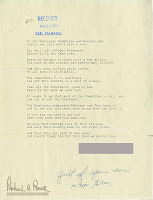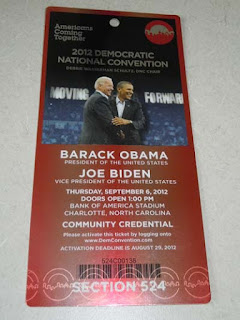Note: In the post below Russell Library student worker/blogger Lori Keong recounts how she and many of her fellow UGA students spent Election Day 2012. The opinions expressed by the variety of people Lori interviewed and gathered feedback from do not in any way represent the views of the Russell Library, which is non-partisan in its mission and activities. This post is simply meant to reflect on the way some students on our campus experienced the 2012 Election.

On Election Day, after sending several texts to friends about their cable services, I lamented the fact that my roommates and I had chosen to skimp on cable TV. Instead, as my roommate and I cozied up around the space heater with a laptop and a bowl of popcorn and as the US map was slowly dyed red and blue with votes rolling in, it was apparent that the race would be as close as recent polls had suggested.
Election Day was the summit of so many months of campaigning from both candidates and personal campaigning from the citizens who supported them. It finally drew a popular victor in candidate debates waged on issues like foreign policy, job creation and unemployment, taxes, healthcare and gay marriage. Without quite the same oomph as the monumental 2008 election—it was more of a celebration of continuity than of new beginnings—but was still a great day to appreciate the rights that we have as American citizens, most importantly our right to vote.
On Election Day 2012, people rushed to the polls to cast their votes, if they had not already voted early or were voting absentee. Recently, my Facebook newsfeed has been littered with Instagram shots of people boasting peach stickers on their breast emblazoned with “I’m a Georgia voter!”
After surveying my friends on Facebook before Tuesday, many said they would be spending their day at the polls and then going to class. Others said that they skipped class to vote, while even more dedicated citizens skipped class and traveled home to vote there. One friend joked that he was going to watch Facebook implode since he had already voted early, while another made this tongue-in-cheek comment: “I'm gonna spend the whole day figuring out which of my favorite candidates to vote for! I wish there was a way to elect ALL the candidates!”
For many friends, it was their first time voting in the general election. Most of us turned 18 after Obama’s first landslide sweep into office. The older I get since I turned 18, though, the more it becomes apparent to me how socially unacceptable it is to choose not to vote. In the college environment, people who don’t vote, for whatever reason, are openly shamed. “I don’t care which candidate you vote for,” said one of my roommates. “Everyone should be voting. It’s your civic duty. That’s what I believe.” Especially with the candidates being so close—even in Georgia, where Romney was expected to win by a large margin, numbers were tight between the two candidates—it seemed even more imperative to cast a vote.
Despite the ever more important role of voting in this close election, there were still many Americans who didn’t vote. Of friends polled who didn’t register to vote, some said that it was a sign of their discontent with both candidates, others expressed ambivalence about the election, while one or two said that they would have voted Republican in a state that was going to swing that way anyways.
A report from the Center for the Study of the American Electorate put 2012 voter turnout at 57.5% of all eligible voters, compared to 62.3% who voted in 2008 and 60.4% who cast ballots in 2004. This year’s voter turnout, however, was still higher than in 2000, when the turnout rate was as low as 54.2%.
This year, the group estimated 126 million people voted in the election, meaning that as many as 93 million eligible citizens did not cast ballots. (Read more about it
HERE).
For Election Day coverage, many friends went to the Georgia Theatre and Little Kings Shuffle Club downtown, or to the Tate Center on campus, to watch the results with the UGA Democrats and other organizations. “The girls in my apartment are hosting an election party Tuesday... the day after we host a Guy Fawkes party,” said one friend. Others had the same idea as me: settling in with a bowl of popcorn to watch the election results at home.
When it became apparent that Obama would win the election, my friends rushed back from a viewing party, with some celebrating and others merely accepting the news. Facebook did not implode, but filled with exclamations of relief, “told-you-so’s,” and some disappointment.
Just a few responses from my newsfeed, posted here:
“so the lesser of the two evils won. oh well. our loss that we don't have the good luck of living under ron paul's presidency.”
“Clear eyes. Full hearts. Four more years.”
“Very upset about who will be leading our country for the next four years.”
“Tonight we celebrate. Tomorrow we get back to work. Here's to all you world changers out there.”
“How "For the People" is our government anyway?”
What do the results of the election tell us, though?
A recent article, “The New America,” from CNN paints a good picture of the national atmosphere that rendered the results of this election. The article noted how progressive the nation has become, as shown by the legalization of marijuana by two states, a record 20 women serving in the US Senate, and the record number of minorities being elected to Congress. According to CNN, the election shows that country is far less conservative than popular belief suggests. However, election results also show a continually fragmented electorate who are still divided on race despite a larger and more diverse population in the United States. (Read more
HERE).
For a larger map of how Election Day played out and people’s favorite moments, check out this Storify of Election Night: 2012 #ElectionDay Highlights http://sfy.co/eAvk #storify #voting #polling
* In the post above Russell Library student worker/blogger Lori Keong
recounts how she and many of her fellow UGA students spent Election Day
2012. The opinions expressed by the variety of people Lori interviewed
and gathered feedback from do not in any way represent the views of the
Russell Library, which is non-partisan in its mission and activities. This post is
simply meant to reflect on the way some students on our campus
experienced the 2012 Election.
Post by Lori Keong, student worker/blogger, Russell Library
 Do you remember the first time you fell in love?
Do you remember the first time you fell in love? 













